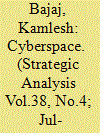| Srl | Item |
| 1 |
ID:
133610


|
|
|
|
|
| Publication |
2014.
|
| Summary/Abstract |
Just as the world was beginning to understand the various dimensions of cyberspace in general, and internet governance in particular, it received the rude shock of the Snowden revelations about the global surveillance carried out by the United States National Security Agency (NSA) in the name of counterterrorism. All kinds of electronic communications of US citizens and non-citizens alike were monitored. Phone tapping and electronic interception were part of this huge operation to collect a haystack of data in the hope of detecting terrorist links to protect national security. The stories that are emerging from the NSA documents made available by Edward Snowden since June 2013 in the Guardian, the New York Times, Der Spiegel and the Washington Post continue to surprise, enrage or shame people depending upon the nation or group that they belong to. The whole world, including those who work for spy agencies, is surprised at the enormity of the scale of surveillance.
|
|
|
|
|
|
|
|
|
|
|
|
|
|
|
|
| 2 |
ID:
147581


|
|
|
|
|
| Summary/Abstract |
extraordinary scope of the National Security Agency’s surveillance capabilities and the facilitating role of the Five Eyes alliance converged with increasing public concerns about the Government Communications Security Bureau Amendment and Related Legislation Bill in 2013. This generated an intense and sustained debate in the country about surveillance policy. It was a debate in which Prime Minister John Key has featured prominently. While apparently unable to clearly refute Snowden’s claims concerning mass surveillance in New Zealand, Key’s vigorous public interventions helped counter the short-term political and diplomatic fallout. However, the long-term impact of public concerns over the surveillance policies of the Key government may be much harder to predict in what is an intimate democracy, and the prospect of substantial political blowback cannot be ruled out.
|
|
|
|
|
|
|
|
|
|
|
|
|
|
|
|
| 3 |
ID:
188539


|
|
|
|
|
| Summary/Abstract |
In Edward Snowden’s surveillance revelations in 2013, online news media had an essential role in constructing discourse on mass surveillance, because sensitive documents were leaked straight to the press. To understand the role of online news in unfolding geopolitical discourses, this discourse analysis examined popular American and British online news reports at the time. The discourse analysis focused on selectivity, priming, and metaphors, while integrating notions on geopolitical code to understand whether online news mirrored the two involved governments’ justifications of surveillance practices. The analysis demonstrated selectivity in which victims of surveillance got attention, and online news tended to prime opinions critical of the surveillance. The justifications of the governments were communicated, but often refuted by other sources quoted in the same stories. Journalists used critical metaphors to convey the scope of the surveillance practices to readers. The findings highlight the role of online news in unfolding discourse of novel geopolitical affairs.
|
|
|
|
|
|
|
|
|
|
|
|
|
|
|
|